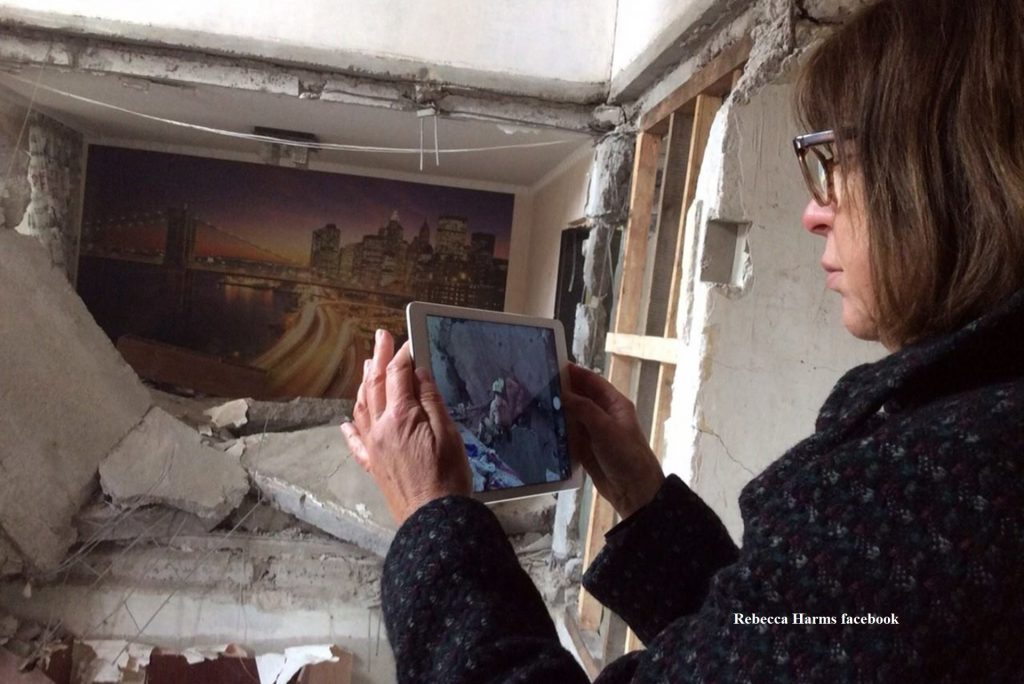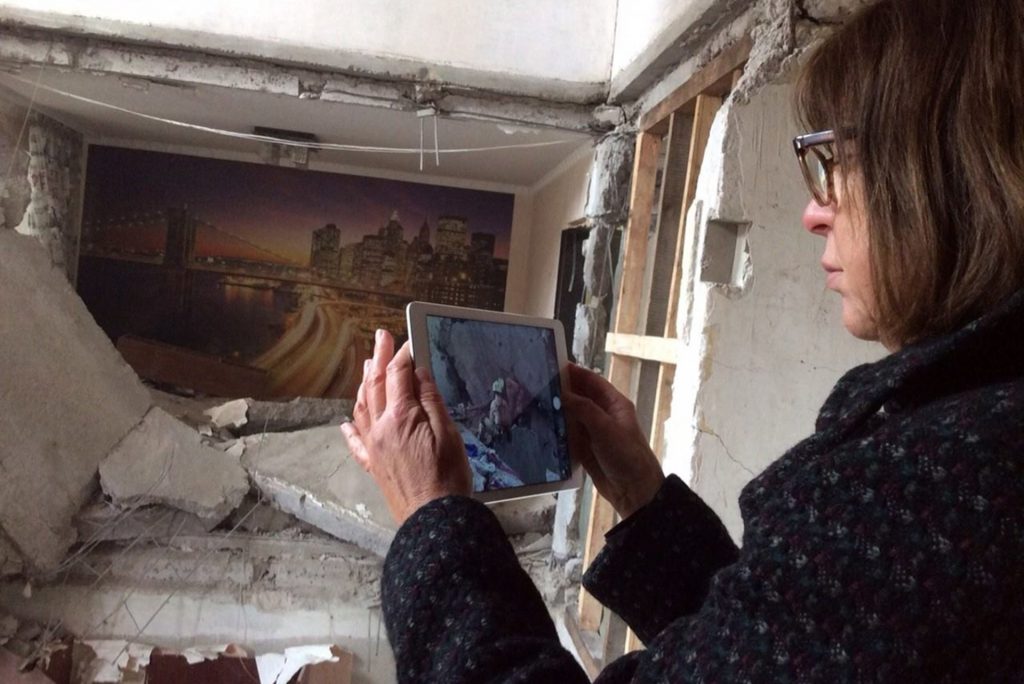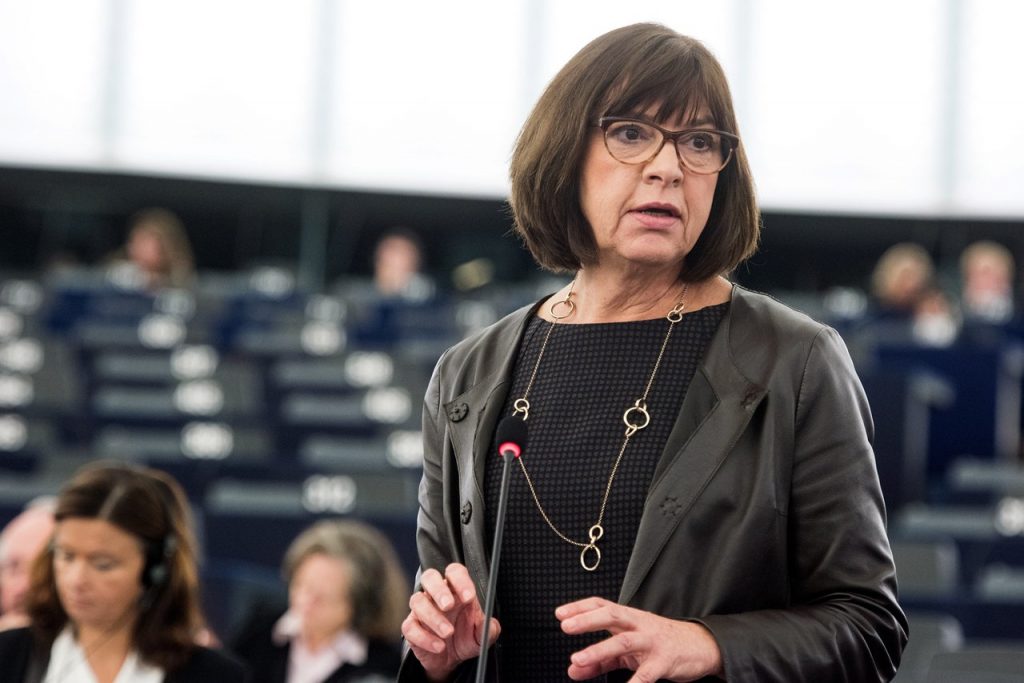Rebecca Harms, Member of the European Parliament, visited Avdiyivka recently. She inspected the city and the areas that suffered the greatest damage from militants’ artillery bombardments, visited the forefront of the Armed Forces of Ukraine and civilians’ destroyed homes. After the visit, she stressed that the European Parliament will make every effort so that Ukraine is not left alone against Russian aggression.
UCMC publishes translated interview from Hromadske.
Dear Rebecca Harms, how many times have you visited Donbas region.
I have visited the frontline five times since the onset of the war. Nevertheless, I have been familiar with several towns and villages for many years and the life there had never been easy. As a civilian coming from Western Europe, where we have peace, I am struck by the impact and destruction caused by the war, whenever I come back.
In many places the living conditions are excruciating. If you cannot find a single untouched tree when you walk through a forest, you understand the impact of the shelling. Then you meet the young men who put their neck on the line during the bombardment. None of these young soldiers wanted the war, but neither are they willing to pull back or to cede more territorial gains to the occupiers.

How can you describe the situation in the area? Has something changed since your last visit?
In Avdiivka, the situation among the civilians is similar to the one I witnessed during my first visit to Slaviansk: The people do not want the war. They are yearning to go back to a normal way of life. By now, for many towns close to the front this simply means: The shooting has to end. But the people in Avdiivka do not even believe in a sustainable ceasefire. Who is to blame? The opinions in Eastern Ukraine are divided. The resentment against the worsening living conditions is tremendous. I can understand that. But I also know that it was not the Ukrainian government who started this war.
I think that Avdiivka is all about increasing the sphere of influence for the separatists over more Ukrainian territory and infrastructure. According to the first Minsk protocol, the contact line would be 2 kilometres away from the current frontline. Aviivka illustrates that the occupation driven by Russia remains despite Minsk.
Did you talk to the inhabitants of Avdiivka? Did they request any form of aid from you, a Member of the European Parliament?
I spoke to members of the local administration, who tried their best to contain the damage done by the heavy shelling and to maintain the water, electricity and heating supply. I have seen the fire fighters who secured buildings in danger of collapsing.
The situation can only improve, if the shelling will end. This time, I did not receive any requests for aid. But it was nonetheless obvious, that more aid is needed. I think the EU must provide humanitarian aid in a much more determined fashion. I also met Commissioner Stylianides during my time in Ukraine with whom I am now going to discuss the provision of EU aid.

How can the EU help Ukraine generally, and Avdiivka specifically?
Even during the first Minsk Protokoll I was very sceptical. Today, I am very certain that we will not have a ceasefire, unless the contact line will be controlled by UN “Blue Helmets”. Peace is only possible on the basis of a ceasefire and the withdrawal of Russian weaponry and troops.
Better living conditions and a real reconstruction are only possible, if these conditions are fulfilled. Humanitarian aid for the people in the East must be much larger and much more visible. And we have to continue to fulfil the aspirations of Euromaidan together. Putin will only be defeated through successful reforms.
What is the overall mood in the parliament regarding support of Ukraine?
The majority of the European Parliament supports Ukraine. Most of them know that the war, which Putin leads against Ukraine, is not only about Ukraine, but about Ukraine and us: freedom and sovereignty, the fundamentals of the European spirit.
Like my friends in Ukraine I grow desperate due to the deficits and mistakes of the EU. The visa-liberalisation takes too much time. Every week a blue convoy with golden stars should head towards Mariinka, Avdiivka and other places.
It is excruciating that Steinmeier, Ayrault and Mogherini always talk about two conflict-parties and forget that the Kremlin is the aggressor and occupier. Too often it looks like the Ukrainians have to fight us. We have to better ourselves in the EU. And those Ukrainians, who will not be deprived of their pro-European spirit, must understand that the EU is involved in internal processes as well. For instance, our own orientation between East and West. The Ukrainians have made this process very visible when they decided to move closer to Europe.

You met the Ukrainian Member of Parliament Hana Hopko to discuss the Donbas-coal-blockade. What do you think about this blockade? How can the situation be solved in a democratic and transparent fashion?
In my last speech I talked about the three fronts, at which the Ukrainians are fighting. Ukrainians have chosen the first front, the front of reforms, for themselves. They were forced into the second front, the front in the war zone, by Putin. The third front of doubts about the West is a front that must be dissolved in the EU.
Ukraine cannot afford a fourth front, an internal front, like the blockade. I can very well understand the reasons for the scepticism against the coal deals. But I believe that the conflicts that have become apparent through the blockade can be dealt with more efficiently at the negotiating table and in parliament. The crucial condition is transparency in order to reveal the economic interests on the one hand, and the constraints on the other hand. That is the task of the Kievan politics and especially the government has to contribute to it. Party-political power games around the issue of the blockade only strengthen those, who want to see the Revolution of Dignity fail.
Russia recently recognised official documents issued by the so-called “People’s Republics of Donezk and Luhansk” Do you not think that the situation in Abchasia and Transnistria is repeated? How does the European Parliament evaluate Putin’s decision?
It was a calculated and rigorous provocation. While Lavrov talks with politicians from the whole world about a ceasefire in Munich, Putin signs an executive order which equates into nothing less than the violation of Minsk. We will have to evaluate this in the upcoming sessions.

The conflict has still not been resolved since an additional Minsk protocol was signed 2 years ago. Several experts believe that this protocol resembles a dead-end street.
In the most recent interview with Deutsche Welle you stated that the Minsk agreements should be critically assessed. Ukraine should regain control over its borders and heavy weaponry and Russian troops should be withdrawn. How can we oblige Russia and the Separatists to do this? Do you have any proposals concerning how we can evade this dead-end street?
I would be happy, if I knew the perfect solution. What is important is that there are no contradicting signals from the West or from the EU. The sanctions against Russia must not be lifted. The sanctions are the basis for a non-military response to the aggression. And now it is important to find a collective evaluation about why Minsk is not working.
Before we start new negotiations, we must have an honest evaluation. We must not simply make appeals to “both sides” again. The occupation of Ukraine is an occupation that would not persist without Russia’s involvement. The occupier has to withdraw his weapons from Ukraine. If that does not happen and instead heavy fighting perpetually breaks out, then we have to ask ourselves: what now?
I personally was in favour of the deployment of UN “Blue Helmets” along the contact line before the first Minsk protocol. I was of the opinion that the mere monitoring by the OSCE is well-intentioned but insufficient. The political architects of the Minsk protocol must understand that Ukraine needs peace, but that Russia will not allow Ukraine to have it. Putin has evidently an interest in re-escalating the war over and over again. Especially those who support a diplomatic solution based on sanctions must understand this.
New negotiations must not ignore the experience from the last two years. Moreover, it is necessary to clarify our position against Russia. The EU must not allow Russia to force it into an arms race but instead, we must quickly find a reasonable Common Security and Defense Policy. It is similarly important that the EU is gaining energy independence from Russia and that this dependence must not be intensified by Nordstream 2. The EU must not finance Putin’s constant armament with importing energy from Russia.
Christian Dieter, Olena Shubkina




